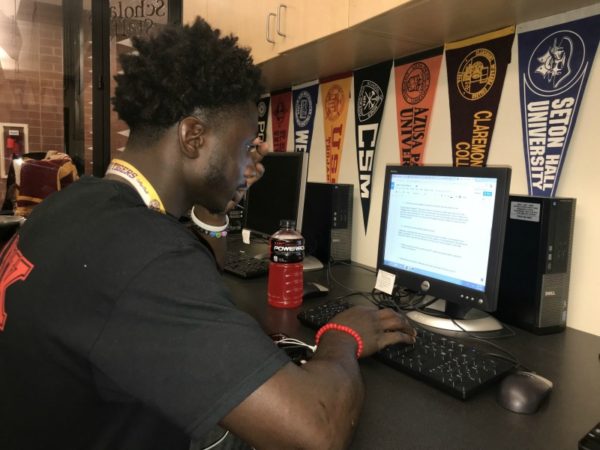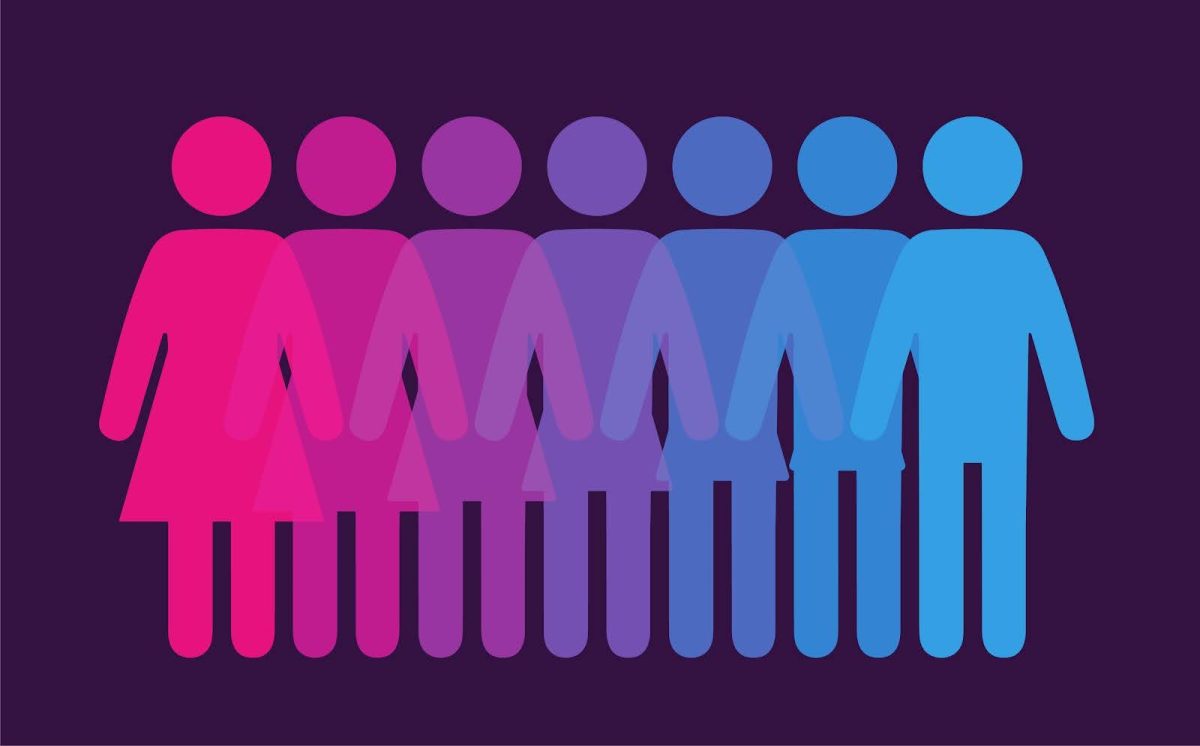Feature Photo By: Ayden Clayton – Senior David Aggrey sits in the college and career center drafting some of his essays for colleges he applied for. Like Aggrey, many other minorities have to work harder to succeed in their classes.
Have you ever heard of the achievement gap? Most minority students such as African Americans, Hispanics, and Natives usually fall lower in test scores and grades compared to their white and Asian counterparts.
Every column, blog, or article that I’ve read on this topic has information that has never come from a African American, let alone an African American male teen standpoint.
Here is a voice that should be heard: mine.
A recent study on achievement gaps performed by Stanford showed that African Americans were last in almost all academic aspect from standardized tests, grades, attendance, and enrollment in honors to AP and college classes. This is very important because the gap is also prevalent right here at RHS.
There really is a problem in the achievement gap. Look at the facts: 25.8% of African Americans are in poverty according to this most recent census. That’s a quarter of all African Americans in the United States.

The great majority of these people live in the South and Northeast. The states with the lowest education rates are mostly filled with African Americans, were 30% of African Americans in states like Alabama,West Virginia, Mississippi, Kentucky, and Tennessee live in poverty.
The problem is more about where students live – in poverty or not – and how their lives are being affected due to problems at home affecting classroom behavior or attention in class. This goes for all races, but the trend is that many of the students with families living in poverty drop out of high school, or are just not getting the right education needed and end up on the lowest part of the achievement gap.
I interviewed English teacher and minority Mr. Carter, who works here at Rangeview High School, and has his own opinion on the topic.
“It’s a hard question, believe it or not, with a simple solution. I believe the achievement gap is a multi-level problem in the education system. The hardest thing about it is telling people it is a significant problem. We can solve it by devoting time and resources to find the problem and we need to address kids from all backgrounds. Kids with better resources usually do better. I think that using standardized tests is somewhat irresponsible because it shows the system has a flaw, and we need to put things into place before we fix it,” said Carter.
Being a black male, I really do see what is going on, and I believe that it can be resolved. The government needs to keep pushing the movement of equality in education that former president, Barack Obama, introduced. The only opposition I have to Obama’s education structure would be to get rid of standardized tests that his administration seemed to favor.
Obama stated in his Harvard speech, “We’ve still got an achievement gap when black boys and girls graduate high school and college at lower rates than white boys and white girls.”
As a student at Rangeview, I’ve had teachers not pay attention to me and ignore me, but that is not the only issue. I’ve been in numerous AP, honors, and CCA classes throughout my high school career. What I really have noticed were the underprivileged kids being treated differently, almost like the teachers thought of them as troublemakers without even knowing them.
I’ve had many teachers stereotype me about drugs, hip hop, if I have a dad, and more, and it made me pretty uncomfortable to the point where I didn’t want to go to the class. I feel that issues such as these that occur in the classroom make students of color not want to focus, and teachers could probably use better on training on how to teach kids that do not look like them.
It is becoming evident that RHS is in need of a serious sit down with some of our staff, such as the principal, teachers, and all administrators. That way, students can see where their minds are and how they are trying to deal with the way they feel about fair conditions in the classroom.
The administrators should also talk to students – particularly minority students – about our wants and needs so we as students can put some input into their ideas. For the students who are struggling, it would be great to have counselors talk to them and find a way that would help the students improve their academic careers, such as tutoring, staying after school, and more.
I have faced the stereotype of being another dropout who is eventually going to jail, but I use that as inspiration every day. I know that all African American males and females can make a change by letting our voice be heard.
Although I haven’t been through as much as other African American students, I’ve been through enough to have my opinion matter. We — as minorities — can also take responsibility to change this problem by staying in school and voting into our government people who will fund impoverished areas.
As a community we need to fight stereotypes together — we either defeat stereotypes together or become the stereotypes ourselves.






